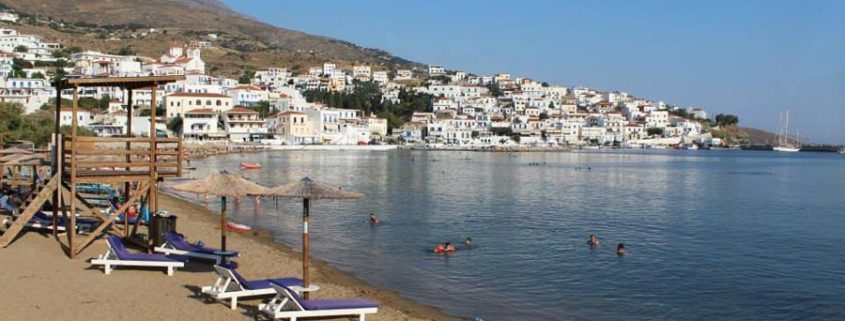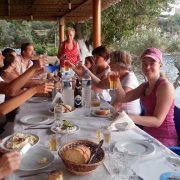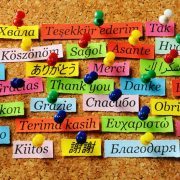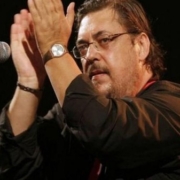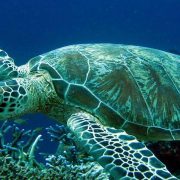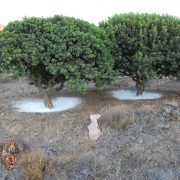“ I have a Greek son in law, an adorable “Adonis”!” we sometimes hear our students saying! Many foreigners join Omilo to learn Greek because they have a son or daughter who lives in Greece, with or without Greek partner. If it finally becomes true love, than, undoubtedly, the day arrives when our motivated students wish to meet the Greek family in Greece. An exciting day to look forward to and at the same time the perfect occasion to practice their newly acquired knowledge of the Greek language. Time to learn some Greek expressions!
The sea is like oil | Η θάλασσα είναι λάδι! (the sea is flat like a pond)
Equipped with quite an extensive Greek vocabulary and thoroughly rehearsed grammar, the “foreign parents” greet the future “petheros” (father in law) and “pethera” (mother in law) of their son or daughter. Of course, all in Greek! Greeks are very impressed when a foreigner tries to say a simple “kalimera” (good morning), “efcharisto” (thank you) or “yiamas” (cheers). If they hear a grammatical correct sentence, they literally remain with their mouth open…
Learning the Greek language is not that difficult and, at the end of the day, much easier than learning Polish, Finnish or Russian. What North-Europeans are not prepared for, are the “strange questions” the Greeks sometimes ask or the differences in their culture.
Spring and autumn are beautiful seasons to plan a visit to Greece. You can enjoy a blue sky, sun and temperatures of around 25 C. Consequently “non-Greeks” take off their shoes in the “Greek house” and go to sit on the balcony. “Den krionete?” (are you not cold ?) is the first question. Or “tha arostisete” (you will get sick), of which Greeks are always sure of. Walking barefoot in the house is asking for trouble and the Greek “pethera” (mother in law) will provide you instantly with a pair of “sagionares” (flip flops) or “pantofles” (slippers). If you are a size 41 or more it is advisable to take your own pair! It is useful to know that the verb “kriono” (I feel cold) comes from the word “krio” (cold), but in the lovely hot sun you do not enjoy a “cappuccino krio”, but a “cappuccino fredo”! Nowadays this version of coffee has become more popular than the classic “frappe”, and can also be ordered “hot”. In this case you order a “cappuccino zesto”.
As spring and autumn temperatures are considerably higher than the average North European summer temperatures, undoubtedly the “Northerners” will put on their swimsuits en spend a day on the beach. “Oxi simera, exei kima” (not today, there are waves!) is the answer to expect. Waves are not very popular with Greeks. Be careful with the word “kima” (wave), the stress is on the first syllable “Ki”. If you pronounce the word with the stress on the “ma”, than you are talking about minced meat, which can throw everything in a state of confusion! Therefore it may be better to use the plural, i.e. “kimata” (waves). If, by mistake, you have started a hopeless conversation about “kima” (minced meat), you might be able to save it by asking if you can defrost the frozen minced meat in the “mikro-kimata” ! (literally : microwave – oven)
So, when do the Greeks go to the beach? When you hear the expression “I thalassa ine ladi” ( the sea is like oil, meaning the sea is as flat as a pond)! No waves, but the Greek sea in combination with Greek oil can’t go wrong! Kalo banio ! (Enjoy your swim !)
Vocabulary
ο γιος – o jos – the son
η κόρη – i kori – the daughter
η πεθερά – i pethera – the mother- in- law
ο πεθερός – o petheros – the father–in-law
(σας) ευχαριστώ – (sas) efcharisto – thank you
γεια σας – yia mas – Cheers, Good health!
κρυώνω – kriono – I am cold
δεν κρυώνω – den kriono – I am not cold
κρύο – kriο – cold
κάνει κρύο – kani krio – it is cold
ζεσταίνομαι – zesteinome – I am warm
ζέστη – zesti – warm
κάνει ζέστη – kani zesti – it is warm
αρρωσταίνω – arrosteino – I am getting ill
θα αρρωστήσετε – tha arrostisete – You will get sick/ill
παντόφλες – pantofles – slippers
σαγιονάρες – sagionares – flip-flops
ο κιμά(ς) – kimaa(s) – mince meat
τα μικροκύματα – mikrokiemata – the microwave oven
η θάλασσα – i thalassa – the sea
το κύμα – to kiema – the wave
τα κύματα – ta kiemata – the waves
η θάλασσα έχει κύμα – i thalassa echi kiema – “there are waves”
η θάλασσα είναι λάδι – i thalassa ine ladi – “the sea is like oil” (without waves, like a pond)
καλό μπάνιο – kalo banio – Literally “ good bathing”, so “enjoy your swim”.

